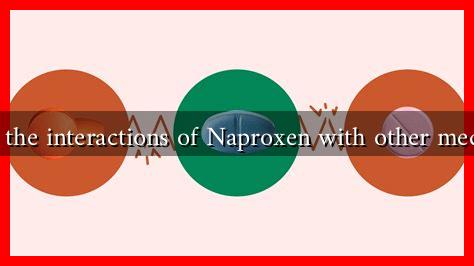-
Table of Contents
What are the Interactions of Naproxen with Other Medications?
Naproxen is a nonsteroidal anti-inflammatory drug (NSAID) commonly used to relieve pain, reduce inflammation, and lower fever. While it is effective for various conditions, including arthritis, menstrual cramps, and headaches, it is crucial to understand how it interacts with other medications. This article explores the potential interactions of naproxen with other drugs, highlighting the importance of awareness for safe and effective use.
Understanding Naproxen
Naproxen works by inhibiting the production of prostaglandins, chemicals in the body that promote inflammation, pain, and fever. It is available over-the-counter and by prescription, making it widely accessible. However, its interactions with other medications can lead to adverse effects or reduced efficacy.
Common Drug Interactions with Naproxen
Several medications can interact with naproxen, leading to increased risks of side effects or diminished therapeutic effects. Here are some common categories of drugs that may interact with naproxen:
- Anticoagulants: Medications like warfarin can increase the risk of bleeding when taken with naproxen. The combination may lead to gastrointestinal bleeding or other serious complications.
- Other NSAIDs: Taking naproxen with other NSAIDs (e.g., ibuprofen, aspirin) can increase the risk of gastrointestinal ulcers and bleeding.
- Antihypertensives: Naproxen may reduce the effectiveness of certain blood pressure medications, such as ACE inhibitors and diuretics, potentially leading to uncontrolled hypertension.
- Selective Serotonin Reuptake Inhibitors (SSRIs): Combining naproxen with SSRIs like fluoxetine or sertraline can increase the risk of gastrointestinal bleeding.
- Lithium: Naproxen can increase lithium levels in the blood, leading to toxicity. Regular monitoring of lithium levels is essential when these medications are used together.
Case Studies and Statistics
Research has shown that the interactions between naproxen and other medications can have significant clinical implications. A study published in the Journal of Clinical Pharmacology found that patients taking naproxen alongside anticoagulants had a 50% higher risk of major bleeding events compared to those not on NSAIDs. This statistic underscores the importance of careful medication management in patients requiring pain relief while on anticoagulant therapy.
Another study highlighted the interaction between naproxen and antihypertensive medications. According to research published in the American Journal of Hypertension, patients taking naproxen experienced a significant increase in blood pressure, which could lead to cardiovascular complications if not monitored closely.
Managing Drug Interactions
To minimize the risks associated with naproxen interactions, patients should consider the following strategies:
- Consult Healthcare Providers: Always inform your doctor or pharmacist about all medications you are taking, including over-the-counter drugs and supplements.
- Regular Monitoring: If you are on medications that interact with naproxen, regular monitoring of blood pressure, kidney function, and other relevant parameters is essential.
- Alternative Pain Management: Discuss alternative pain relief options with your healthcare provider if you are at high risk for interactions.
Conclusion
Naproxen is a widely used NSAID that can provide significant relief from pain and inflammation. However, its interactions with other medications can pose serious risks, including increased bleeding, reduced efficacy of other drugs, and potential toxicity. Understanding these interactions is crucial for safe medication management. Always consult with healthcare professionals before starting or stopping any medication, and ensure regular monitoring if you are taking multiple drugs. By being informed and proactive, patients can effectively manage their pain while minimizing the risks associated with drug interactions.

